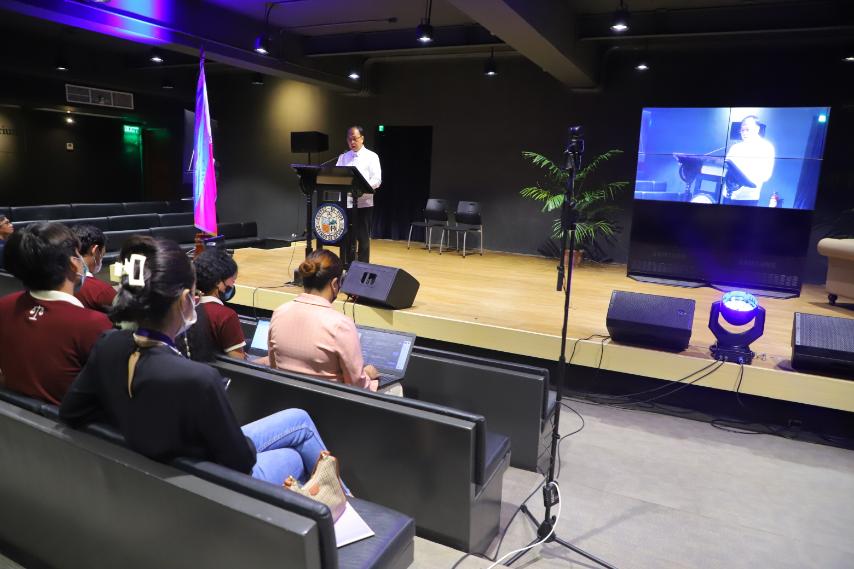DAVAO CITY (24 November 2022) – The Office of the Presidential Adviser on Peace, Reconciliation and Unity (OPAPRU) vowed to push for the promotion, adoption and institutionalization of the Human Fraternity Document across all key sectors of society.
This was the commitment made by Presidential Peace Adviser Sec. Carlito G. Galvez, Jr. during a peace forum held here at the Ateneo De Davao University dubbed #BrotherandSisters: Human Fraternity as a Guide in Living in Peace and Establishing Peaceful Communities.
The Human Fraternity Document, signed by Pope Francis and the Grand Imam of Al Azhar, Ahmad Al-Tayyeb in 2019 has been described as a “remarkable” document, as it is the result of a historic dialogue between leaders of two of the world’s largest and most influential religions.
Galvez said there is a need to increase the “sense of awareness” among Filipinos regarding the document, a situation which the OPAPRU hopes to address in partnership with its peace partners.
“The most challenging part of this [effort] is…making people [aware] that this document exists,” he noted, which would require an inclusive, integrated and holistic approach focusing on both local and international stakeholders.
The Human Fraternity Document upholds the following principles:
- The firm conviction that authentic teachings of religions invite us to remain rooted in the values of peace;
- Freedom is the right of every person; each individual enjoys the freedom of belief, thought expression and action;
- Justice based on mercy is the path to follow in order to achieve a dignified life to which every human being has a right;
- Dialogue, understanding and the widespread promotion of a culture of tolerance, acceptance of others and of living together peacefully would contribute significantly to reducing many economic, social, political and environmental problems that weigh so heavily on a large part of humanity;
- Dialogue among believers means coming together in the vast space of spiritual, human and shared social values, and from here, transmitting the highest moral virtues that religions aim for;
- The protection of the places of worship – synagogues, churches and mosques – is a duty guaranteed by religions, human values, laws and international agreements;
- The concept of citizenship is based on the equality of rights and duties, under which all enjoy justice;
- Good relations between East and West are indisputably necessary for both. They must not be neglected, so that each can be enriched by the other’s culture through fruitful exchange and dialogue;
- It is an essential requirement to recognize the right of women to education and employment, and to recognize their freedom to exercise their own political rights;
- The protection of the fundamental rights of children to grow up in a family environment, to receive nutrition, education and support, are duties of the family and society;
- The protection of the rights of the elderly, the weak, the disabled, and the oppressed is a religious and social obligation that must be guaranteed and defended through strict legislation and the implementation of the relevant international agreements; and
- Terrorism is deplorable and threatens the security of people, be they in the East or the West, the North or the South, and disseminates panic, terror and pessimism, but this is not due to religion even when terrorists instrumentalize it.
“We aim to promote the [Human Fraternity] Document to various international partners such as the United Arab Emirates, United States, Germany, Sweden, France, among others,” the peace adviser said.
Galvez said the agency will also promote the document with government institutions such as the anti-terrorism council and other line agencies, including the departments of defense, interior and local government, environment, and the National Commission on Indigenous People.
“At the local level, there is also a need for us to promote the document [with] the Catholic Bishops Conference of the Philippines, ulama councils and other CSOs to secure their support,” he added.
In order to realize and sustain the objective of the Human Fraternity Document, Galvez said the OPAPRU will push for the institutionalization of the document in the government’s national peace agenda.
“This is to ensure the inclusion of the document as a guiding principle in teaching [the] peace education agenda among formal and informal learning institutions in the country,” he emphasized.
Galvez stressed the institutionalization of the Human Fraternity Document will be crucial in the implementation of the proposed executive order that aims to strengthen the mainstreaming of peace education in the basic and higher education sectors.
“Our objective is to promote the culture of peace, enhance community resilience for peace, and provide a proactive approach to counter various forms of recruitment and mobilization by violent extremist groups, especially among vulnerable communities and individuals,” he said.
In September of this year, over a hundred peace education champions from all over the country converged in Davao City to participate in the First National Peace Education Summit organized by the OPAPRU’s Social Healing and Peacebuilding Office.
The summit provided a venue to gather recommendations from the participants on how to effectively mainstream peace education in the basic and higher education sectors, and facilitate more robust peace constituency-building interventions through partnerships. ###












